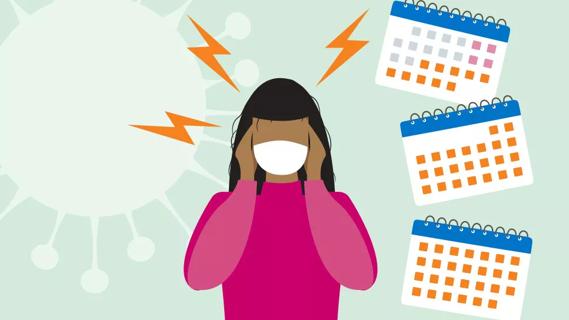Advertisement
Are You Up to Date on Your COVID-19 Vaccines?
Updated vaccinations are recommended to better protect against the evolving virus

Remember the rush to get a COVID-19 shot when the vaccines first arrived? Hundreds of millions of people rolled up their sleeves and got jabbed to protect themselves and others from the virus.
Advertisement
Cleveland Clinic is a non-profit academic medical center. Advertising on our site helps support our mission. We do not endorse non-Cleveland Clinic products or services. Policy
Today, of course, the pandemic is over — but COVID-19 continues to circulate and infect people around the world. It’s not gone.
That’s why being up to date on COVID-19 vaccinations remains a global health priority, says infectious disease specialist Kristin Englund, MD. Here’s what you need to be considered fully vaccinated for COVID-19.
COVID-19 vaccination recommendations
COVID-19 continues to evolve with new variants and subvariants emerging. Dozens of different strains have been reported since 2020. Today, Omicron and its offshoots are the predominant variants circulating.
As the virus goes through these changes, your body’s defense against these new attackers needs to be reinforced. “Mutations to the virus go well beyond what the initial vaccines covered,” explains Dr. Englund.
That’s why the Centers for Disease Control and Prevention recommends getting an updated 2023-2024 COVID-19 vaccine to better protect yourself against newer variants and serious illness.
Three updated 2023-2024 vaccines are available: Pfizer-BioNTech, Moderna and Novavax.
COVID-19 vaccination guidance from the CDC varies by a person’s age, vaccination record and health condition. Here’s a rundown.
Children aged 6 months to 4 years
Recommendations for this age group are as follows.
- Children previously vaccinated against COVID-19 should get one or two doses of an updated Moderna or Pfizer-BioNTech vaccine depending on which vaccine and number of doses they previously received.
- Children who have not been vaccinated against COVID-19 should get two or three doses of an updated vaccine, depending on whether they receive the Moderna or Pfizer-BioNTech vaccine (or a combination of the two).
Children aged 5 years to 11 years
One updated Moderna or Pfizer-BioNTech vaccine is recommended for children in this age group who are either unvaccinated or previously got a vaccine before Sept. 12, 2023.
People aged 12 and older
Recommendations for this age group are as follows.
- People previously vaccinated against COVID-19 should get one dose of any updated vaccine if the previous COVID-19 vaccination was before Sept. 12, 2023 (if it was Moderna or Pfizer-BioNTech) or Oct. 3, 2023 (if it was Novavax).
- People who have not been vaccinated against COVID-19 should get either one dose of the updated Moderna or Pfizer-BioNTech vaccine or two doses of the updated Novavax vaccine.
Adults age 65 and older
For this age group, an additional dose of any updated COVID-19 vaccine is recommended at least four months following the first updated dose.
People who are immunocompromised
Those who are moderately or severely immunocompromised may benefit from additional doses of an updated COVID-19 vaccine. Talk to your healthcare provider about your specific timing needs.
Advertisement
How long does COVID-19 immunity last?
Vaccines train your immune system to recognize and destroy harmful invaders (such as COVID-19). They teach your body to protect itself by giving intel on potential threats. (Basically, it’s a biological cheat sheet.)
It takes about two weeks after getting a COVID-19 vaccination for your body to build up immunity against the virus, says Dr. Englund. After that, you’re considered “fully vaccinated” against COVID-19.
Data from the CDC shows the effectiveness of COVID-19 vaccines. A 2024 report showed that people who received an updated vaccine were 54% less likely to get COVID-19. (The findings focused on the four months from mid-September 2023 to January 2024.)
That protective power, however, naturally declines over time. Dr. Englund says COVID-19 vaccines generally hold firm against the virus for about a year. After that, the shielding effect loses some oomph.
New COVID-19 variants also can lessen the effectiveness of vaccines over time.
“As the virus mutates and changes the vaccine loses some of its efficacy in addition to waning over time,” explains Dr. Englund. “Getting an updated vaccine is important to protect yourself and those around you.”
Does ‘natural immunity’ make a difference?
Getting COVID-19 also educates your immune system on the virus and offers some security against future infection. But like vaccines, that immunity lessens over time and does not cover new variants.
The CDC recommends getting an updated COVID-19 vaccine even if you have had the virus. (The suggested wait time is 90 days after infection.)
Research shows that people who do not get vaccinated after recovering from COVID-19 are more likely to get reinfected than those who get an updated vaccine to boost their natural immunity, notes Dr. Englund.
How many people have some COVID-19 immunity?
More than 98% of the population in the United States has some protective immunity against COVID-19 through vaccination, prior infection or some combination of the two, according to the CDC.
However, CDC data shows that a much smaller percentage has received an updated COVID-19 vaccine.
Long-term outlook for COVID-19 vaccinations
Looking ahead, Dr. Englund envisions vaccination against COVID-19 following a similar pattern as what’s done for influenza (aka, the flu). In other words, an annual shot to guard against infection and serious illness.
There’s even work underway on a combined flu/COVID-19 vaccine.
“This all falls under the concept of public health,” says Dr. Englund. “Getting vaccinated is part of our moral obligation to make sure we’re doing everything we can to lower the spread of these viruses and protect those around us.”
Advertisement
Learn more about our editorial process.
Advertisement
Related Articles

Should You Be Worried About COVID Arm?
Redness, swelling, itching and rash can happen when your body’s immune system reacts to the vaccine injection

What Is Asymptomatic COVID-19 and Are You Contagious?
Studies suggest 1 in 5 people infected with the coronavirus never develop symptoms

The Connection Between COVID-19 and Blood Clots
An increased risk of blood clots can last for nearly a year after a COVID-19 diagnosis

If Your Immune System Is Compromised, Can You Get Vaccinated?
The answer varies from person to person and vaccine to vaccine

The Link Between COVID-19 and Tinnitus (That Ringing in Your Ears)
COVID-19 may be associated with tinnitus, but research is still ongoing

How Does COVID Immunity Work?
The short answer: It’s complicated, but the basic care precautions still prevail, like washing your hands and isolating if you’re sick

What To Know About COVID Headaches
They can feel like a typical headache or a migraine headache, but the pain can last for weeks to months

What Constitutes a ‘Superspreader Event’?
Any large social gathering — from a family birthday party to an indoor music concert — has the potential to spread serious infection
Trending Topics

Here’s How Many Calories You Naturally Burn in a Day
Your metabolism may torch 1,300 to 2,000 calories daily with no activity

5 Sinus Massage Techniques To Relieve Pressure and Promote Drainage
A gentle touch in all the right places may help drain your sinuses
